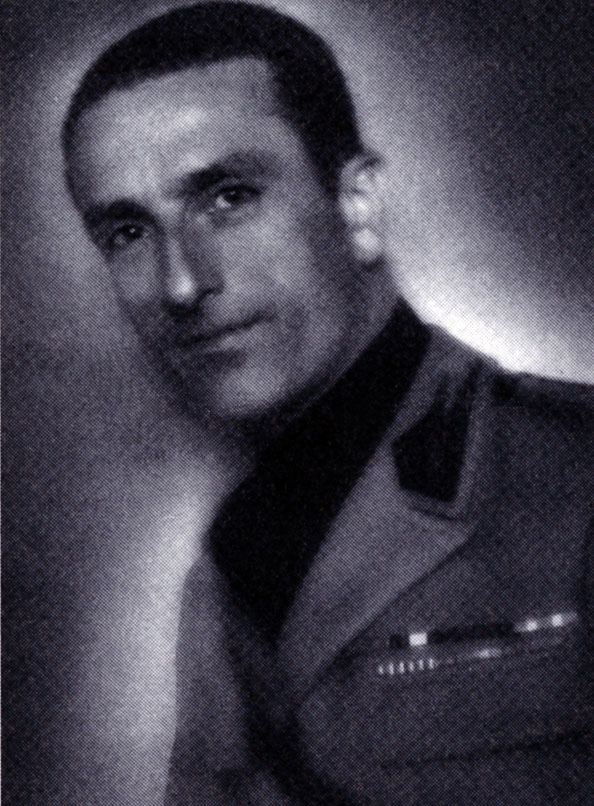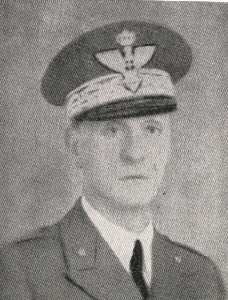<Back to Index>
- Secretary of the National Fascist Party Francesco Giunta, 1887
- Secretary of the Provisional Directorate of the National Fascist Party Roberto Forges Davanzati, 1880
- Fascist Leader Cesare Rossi, 1887
PAGE SPONSOR

Francesco Giunta (21 March 1887 - 8 June 1971) was an Italian Fascist politician.
Born in the Tuscan town of San Piero a Sieve, he started his career as a lawyer. He served as a machine gun captain in the World War I. An early member of the Italian fascist movement, he was the leader of fascio in Florence before being sent to Trieste in 1920 to work under Gabriele D'Annunzio. Under the direction of D'Annunzio he became the propaganda chief in Fiume.
He became one of the organizers of Fascism in the Julian March (Venezia Giulia), the easternmost region of Italy, acquired from the Austro - Hungarian Empire after 1918. He worked with Benito Mussolini to set up a number of Fascist squads that attacked a group of allegedly separatist Slovenes in northern Istria. As a Fascist leader (ras) of Trieste, he built up an early mass support base for the Fascist movement. In July 1920, he led the squad that burnt down the Narodni dom, the community center of the Slovenes in Trieste. Giunta gained fame in March 1922 when he followed the example of D'Annunzio by staging a coup in the Free State of Fiume with 2000 followers and by doing so laying down the foundations for the official Italian takeover in 1924. In October 1922, he commanded the Fascists from the Julian March on the March on Rome. His leading position in the early years of fascism came despite his Freemasonry, a movement to which Mussolini was bitterly opposed.
He became national secretary of the National Fascist Party in succession to Michele Bianchi in 1923 and oversaw the move towards an increasingly diminished role for the party rank and file as Mussolini consolidated his government. Replaced by Roberto Farinacci the following year, Giunta settled into an undersecretary's role in the cabinet office. In this role he was pivotal in signalling one of the future intentions of Italian foreign policy when he stated in an April 1933 visit to Malta that he was on Italian soil and that the future of the island lay in complete union with Italy.
In February 1943, he succeeded Giuseppe Bastianini as the governor of Italian occupied Dalmatia. A fervent anti - Yugoslav since the times of his activity in the South Slav inhabited Julian March, Giunta brought a number of his old colleagues from Trieste with himself. His regime became noted for its brutality against the local Croat population, and a fierce repression of the Yugoslav partisan movement present in the area.
After World War II, Yugoslavia demanded the extradition of Giunta, so that he could be tried for war crimes committed in Yugoslavia. The Yugoslav demand was rejected by both Italy and the Allies. Giunta settled in Rome, where he died in 1971.
Roberto Forges Davanzati (born 23 February 1880 in Naples - died 1 June 1936 in Rome) was an Italian journalist, academic and politician. Initially a syndicalist he later became a nationalist and fascist.
After obtaining a degree in law Forges Davanzati, a member of the Italian Socialist Party, became a journalist with the party papers Avanti! and Avanguardia Socialista. Associated with the syndicalist tendency of the party his interest in nationalism grew and in 1906 he left the PSI to take up a position at the paper Pagine Libre, which had been founded by Angelo Oliviero Olivetti and which soon became associated with national syndicalism.
Forges Davanzati soon converted to full nationalism and took a position with Corriere della Sera, at time a nationalist sympathizing paper. He became one of the founders of the more hard line nationalist newspaper L'Idea Nazionale in 1911. He confirmed his full conversion by joining the Italian Nationalist Association before leaving to serve in the First World War.
Associated with the pro - fascist tendency within the INA immediately after the war he endorsed the merger of the two groups and was the secretary of the provisional directorate of the National Fascist Party immediately after the fusion of the two groups. He also served as a member of the Grand Council of Fascism and from 1925 was editor of La Tribuna - Idea Nazionale, a merger of the two group's newspapers. He was appointed to the Italian Senate in 1934. Benefiting from his closeness to the government, Forges Davanzati also taught political science as the Sapienza University of Rome and broadcast a daily radio show Chronicles of the Regime.

Cesare Rossi (born 21 September 1887 in Pescia - died 9 August 1967 in Rome) was an Italian fascist leader who later became estranged from the regime.
Rossi began his political career on the left with the Italian Socialist Party and as a writer for various syndicalist journals. However he left the Socialists in 1907 to serve in the Italian Army and did not rejoin following his demobilization. Instead he embraced syndicalism fully by becoming a leading member of the Unione Sindacale Italiana. He joined the Fasci di Azione Rivoluzionaria in 1914 and by 1919 this had led to him joining the Fasci italiani di combattimento.
A leading writer for Il Popolo d'Italia, Rossi was recognized as one of Benito Mussolini's closest advisers in the early days of the fascist movement. Rossi soon gained a reputation for his moderation and was instrumental in the Pact of Pacification, a 1921 agreement that temporarily slowed down the violence of the Blackshirts. Working with Mussolini he also developed a strategy of trying to win over the left into a cross class alliance. He attained the rank of assistant secretary of the movement in 1921 and was effective leader in Tuscany whilst he went on to sit on the National Fascist Party national council and the Grand Council of Fascism.
He was the leader of a fasci and an important figure in the March on Rome. Following this seizure of power Rossi was appointed director of Mussolini's Press and Propaganda Office. He was also central in organizing not only the 1924 election but also the reprisals against the areas that had rejected fascism which followed. A potential conflict of interest had arisen in February 1923 when Mussolini banned Fascist Party members from involvement in Freemasonry but ultimately the ban was not enforced as Rossi was just one of a number of Freemasons prominent within the party.
Rossi's rise through the ranks of the fascist state came to an abrupt end in 1924 with the murder of Giacomo Matteotti after he was accused of being responsible. It was argued that Rossi, who had flew into a rage after one of the two speeches that sealed Matteotti's fate, had ordered his deputy Amerigo Dumini to kill the Socialist deputy for his anti - fascism. The incident, which angered even some fascists, led to a split between Rossi and Mussolini.
Rossi fled to France and then Switzerland to escape prosecution and became a critic of fascism in his exile. He was tricked into returning to Italy in 1928 and was sentenced to 30 years imprisonment for his part in the murder. He was released after the fall of fascism and, following some investigations into his own past that acquitted him of involvement in the excesses of fascism, he returned to journalism and left politics behind.